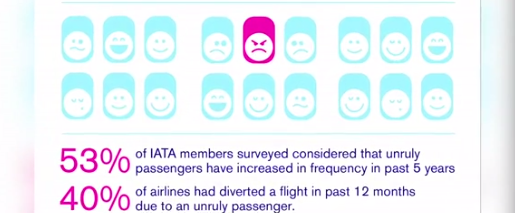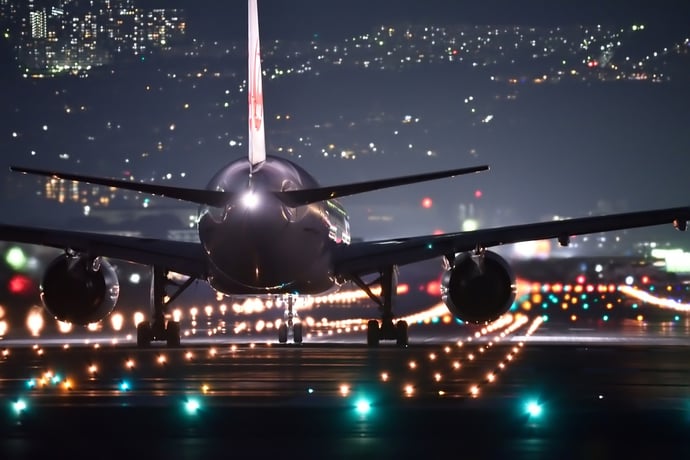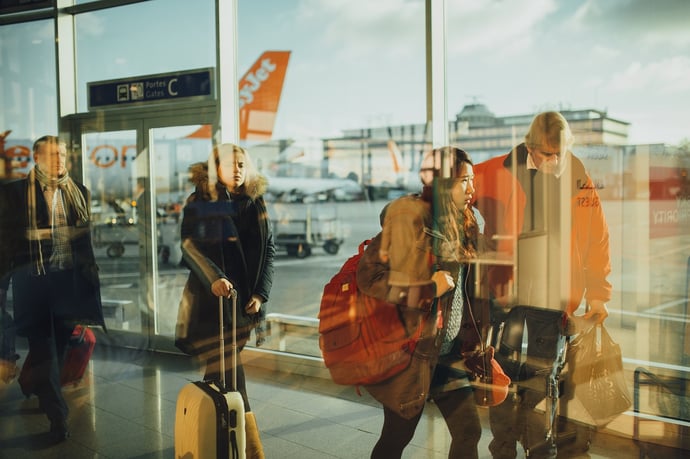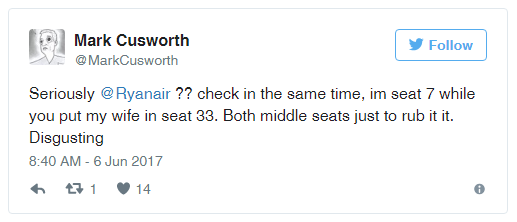No one likes flying. Not just because we are defying the laws of nature by taking over the domain of birds every time we take to the skies, but because for some reason Quality Management in the industry has taken a backseat to profit and boy does it take a backseat to profit.
The Problem With Flying: An Industry of Arrogance
There's not enough leg space, the seats are uncomfortable and you might even have the pleasure of engaging in a little air rage with a fellow passenger or crew if recent news coverage is anything to go by.
The recent controversy with United Airlines brought to the surface something that had been bubbling under the surface of the consumer populous for some time now. Flyer Rights spokeswoman Kendall Creighton points to a building rage (especially in the United States) within consumers who have had enough of the sub-par product they have been made to swallow for years.
"A lot of the incivility we've seen lately comes from stress. From the moment you arrive at the airport and have to deal with the automated self-check-in kiosks that have replaced human counter staff, to the long lines at security, to the gotcha fees at the gate, then maybe an announcement that your flight's overbooked - and if it isn't, then it's guaranteed to be 100 per cent full."
Unruly passenger incidents have increased from one incident in every 1600 flights to one in every 1200 flights. Several practices within the airline industry have led to this noticeable increase in unruly passenger behaviour and these practices are, shall we say, archaic. So much so that they have prompted the Canadian Government to table a Passenger Bill of Rights for air travel.

Kendall Creighton states that most complaints she receives are due to shrinking leg room and cramped seats. "People are tired of being packed into airplanes like sardines...It's a real pressure cooker now. We're putting 100, 200, 300 people in an aluminium tube, usually designed for far fewer, because the airline industry is always looking to add capacity".
In 2010 Ryan Air notoriously planned on implementing standing seats to its aircraft and wanted to fund changes by charging its passengers £1 to use the toilet during flights. They were eventually thwarted by airline authorities. More recently, consumers were again angry at Ryan Air for seemingly punishing them by deliberately splitting people up who hadn't paid extra for allocated seating.
Creating a Hierarchy of Customer Importance and Why it's Terrible for Quality Management
Sure Ryan Air is a budget airline and sure there are probably a large amount of people who would happily stand, pay for toilets or be split up from their loved ones for a couple of hours if that meant they could travel even cheaper but this type of activity points to the type of attitude which is less about providing the best service you can, no matter what package the consumer pays for, and more about making sure that the consumer pays a bit more because the alternative will mean being treated like a second-class citizen.
There has been a noticeable decline in quality services, consumer care and at times outright hostility towards customers who have paid for a service but are treated poorly because they subscribed to the 'basic package'. After all, human beings still expect to be treated like human beings even if they have elected for the no-frills approach to air travel - we are funny that way.
The now notorious United Airlines bumping of David Dao, the doctor dragged from his seat and left with a concussion, a broken nose and missing teeth, brought to light a massively problematic business practice that exists industry-wide and is built on a hierachy of consumer importance which is explained in United's contract of carriage. This outlines how it treats passengers and which of them are likely to be denied boarding: "the priority of all other confirmed passengers may be determined based on a passenger’s fare class, itinerary, status of frequent-flyer program membership, and the time in which the passenger presents him/herself for check-in without advanced seat assignment."
Imagine turning up to watch your movie at the cinema and finding out that your seat was on-sold because you didn't buy a ticket for premium seating. Sure you could get a refund, but that doesn't make up for the fact that you travelled to the cinema to use your free time for a service you had purchased in advance and were told 'sorry, because you paid for the least expensive service we offer, your ticket was sold to someone else' - it doesn't make sense.
Tim Colehan, who leads IATA's work on dealing with unruly passengers, says that "democratised travel" (more people being able to fly who previously couldn't) isn't the problem. ''It affects all different kinds of airline and it's in first, business and economy [classes] and all regions of the world. It really is a global problem."
This suggests to me that when there are significant examples of consumer unhappiness on the rise in every sub-section of the services the industry is offering, the failure is really on the shoulders of Quality Management and an industry that does not put value on the quality of what they do. The United Airlines uproar was bad, but there is a greater problem here with an industry that does not understand its passengers, that does not communicate with its passengers and does not realise that whatever service you offer at whatever the pricepoint, make sure you deliver the best service you can, when you can.

Joseph Turow, professor of communications at the University of Pennsylvannia, explains that, “Irrespective of any individual fare, they (airlines) have this overarching notion of who their valued customers are, and what their lifetime value is...because of the structure of the system, they can take advantage of it to the point of being mean to people.”
This article in the Atlantic has more on why Airlines can get away with bad customer service.
2017: The Year the Consumer Fought Back
2017 has become the year the consumer fought back against the airlines and the year that the airlines punched them in the face repeatedly for daring to question their air superiority (a little hyperbolic but you get the idea).
Since David Dao's incident, there has been an increase in stories on 'airline bumping' and passengers refusing to leave the aircraft. This has obviously caused greater scrutiny of an industry that has quite a frightening level of power over their customers.
Let's go back to the practice of airline bumping. It's a common practice in the industry. Every year around 50,000 people with valid tickets are bumped off flights due to overbooking - a practice which is intentional because the airlines know that some passengers won't show up and as such, they can make extra profit from selling a seat twice.
Gilbert Ott, founder of the air travel website godsavethepoints.com, said: "Airlines run like hedge funds and are so analytical these days that they rarely fly with empty seats and oversell, betting that at least a few will no show. Bumps can be a very lucrative “gaming” of the system for passengers, as evidenced by someone who made $10,000 dollars in Delta vouchers...after getting bumped off of multiple consecutive flights."
However, if passengers aren't flexible this can turn into a real disaster.

What this means is that there is a good opportunity for an airline to step up and win the innovation and quality game in the air. It's a broken system. From the time you first travel to the airport with your luggage, check-in, walk through security and actually get on the big metal tube hurtling through the sky defying nature (not to mention standing in the cattle lines of immigration on the other side), air travel has developed the ability to turn the most saintly patron into a swearing sailor.
Emirates and Total Quality Management: Putting Quality at the Heart of Your Business
Time and time again we see the impact of poor quality management in business and the results of quality failure shows us that simply having an ISO standard or EFQM certification isn't enough - quality must be at the very centre of the product being offered by today's modern businesses.
Sir Tim Clark, President Emirates Airline, has stated that: “Emirates has always put our customers at the heart of what we do, and we work hard to deliver the very best experience possible to our customers at every touchpoint, every day, all around the world. We constantly invest in our product and services, both on the ground and in the air. We listen carefully to our customers, and then relentlessly challenge ourselves to deliver and exceed expectations."
Maybe that's why they are the best airline in the world according to the SkyTrax World Airline Awards (an award based largely on consumer satisfaction).
Tim Clark's statement says it all in regards of the Emirates approach to quality:
- Placing the customer at the heart of what they do
- Delivering the best experience possible at every touchpoint
- Investing in products and services in all areas of the service they provide
- Listening to customers and exceeding expectations
It's not rocket science really. Deliver the best product or service you can while continually investing in quality and exceed your customer's expectations There is already a heavy blueprint out there for quality success whether it be ISO or EFQM that have already been mentioned or the 7 wastes of Lean Manufacturing that gives organisations a methodology for creating quality products and services that please the customer, cut out wasteful processes and provides a greater return on investment where the business is concerned.
Airline quality has gotten lost in the price war that has engulfed budget airlines and full-service airlines alike. As far as quality goes, it is a great case study for why profit should never be placed ahead of quality and why an airline such as Emirates can become the world's number one airline because of their focus on Total Quality Management.
If you're a professional interested in placing quality at the heart of your business then you can download our white paper which outlines how you can get ISO 9001 certification
Here at Triaster, we always love receiving your comments on our blogs (positive or negative) which you can leave below and if you liked this article please share with others using our social buttons.
Related Articles:
The Top 10 Things Your Quality Management System Must Deliver
What is the cost of quality failure?
How to Achieve a Quality Strategy for your Business
Written by Brad Fagan
Brad joined Triaster in 2016 as our Content Marketing Executive hailing all the way from Middle Earth (the film version, not the book) – New Zealand. Brad’s video skills soon resulted in new weekly Triaster videos and his individual touch in some of the Connector and blog articles. In June 2018 Brad moved to Germany with his wife Lynn.



